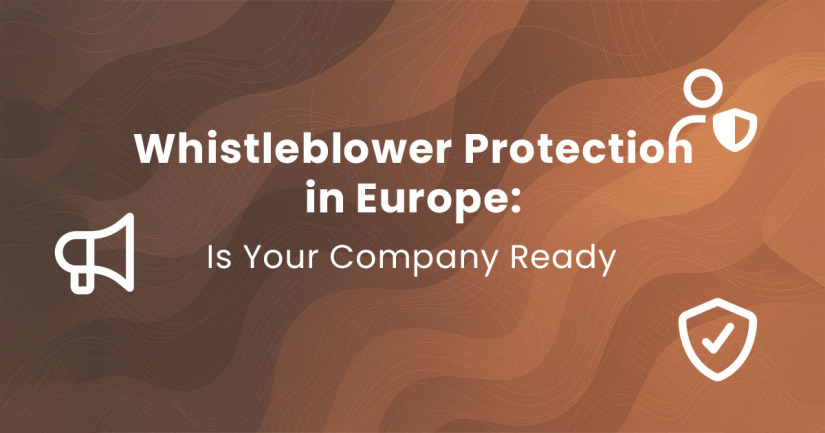Whistleblower Protection in Europe: Is Your Company Ready

Whistleblower protection laws are now binding across the European Union, requiring companies with at least 50 employees to implement secure reporting channels. This is not only a legal obligation but also an opportunity to build a transparent and ethical organizational culture. In practice, companies must already have procedures and tools in place to guarantee anonymity and protect whistleblowers from retaliation.
The Problem: Fear of Retaliation Silences Employees
Picture an employee witnessing serious misconduct in their company – harassment, corruption, or safety violations. They want to report it, but they fear dismissal, demotion, or other forms of retaliation. This fear is real and often prevents whistleblowers from speaking up, allowing harmful practices to spread. The absence of a safe reporting channel is a direct path to reputational crises, financial losses, and legal challenges.
Have you ever known something was wrong but were afraid to say it? This is exactly the issue the EU directive addresses.
The Solution: EU Directive and National Whistleblower Laws
To address this, the European Union introduced Directive (EU) 2019/1937 on the protection of persons who report breaches of Union law. The directive sets minimum standards of whistleblower protection across member states, requiring companies to establish internal procedures that ensure confidentiality and protection against retaliation.
Current Implementation Across Europe
Most EU countries have now completed the implementation, though timelines varied:
- Poland: The Whistleblower Protection Act came into force on 25 September 2024. Companies with at least 50 employees must implement internal reporting procedures. Non-compliance may result in fines, and retaliation against whistleblowers can be punished with imprisonment of up to 3 years.
- Germany: The Hinweisgeberschutzgesetz (HinSchG) has applied since 2 July 2023. Companies with 50 to 249 employees had until 17 December 2023 to comply. German law strongly emphasizes confidentiality and whistleblower identity protection.
- Italy: Legislative Decree No. 24/2023 was adopted in March 2023. Like elsewhere, the obligation applies to firms with at least 50 employees. The National Anti-Corruption Authority (ANAC) plays a central supervisory role.
- Czech Republic and Slovakia: Both countries passed implementing laws. Slovakia already had whistleblower protection in place, which was amended in 2023 to fully align with EU standards.
Wherever your company operates in the EU, compliance is now mandatory. It is both a legal duty and an investment in organizational stability and reputation.
Example: A Safe Reporting Channel Prevented a Corporate Crisis
Consider a large manufacturing company where a manager systematically falsifies product quality reports to boost performance and secure bonuses. A junior employee discovers the scheme. Thanks to an anonymous whistleblowing system in place, they file a report. The board initiates an internal investigation, confirms the fraud, and dismisses the manager. As a result, the company avoids releasing defective products, which could have led to major financial losses, legal repercussions, and loss of customer trust.
This fictional example reflects a real truth: an effective whistleblowing system allows early detection and resolution of issues before they escalate into crises.
A Twist: Whistleblower Protection as a Competitive Advantage
Implementing a whistleblowing system is not just about compliance. It signals to employees, clients, and partners that your company values transparency and integrity. This builds trust and strengthens your position as a responsible employer and business partner. In today’s environment, where reputation is one of the most valuable assets, such an investment pays off many times over.
Have you considered that giving your employees a voice is, in fact, protecting your company?
Call to Action: Protect Your Company with Whispla
Not sure where to begin? Setting up a secure and effective whistleblowing system can seem complex. That’s why ready-made, tested solutions are worth considering. Whispla is an intuitive and fully anonymous platform that helps your company meet legal obligations while fostering a culture of trust. The system complies with the EU directive and is adapted to national requirements across Europe.
Five minutes of conversation can save you five hours of stress. Contact us to see how Whispla can support your organization. Try it free for 30 days and discover how simple it is to build a transparent and safe workplace.
FAQ - Frequently Asked Questions
1. Who is required to comply with the whistleblower law?
All private and public entities with at least 50 employees are covered. In some sectors, such as finance, the requirement applies regardless of company size.
2. What are the penalties for failing to implement a whistleblowing system?
Penalties vary by country but can be severe. In Poland, lack of internal procedures may result in fines, while retaliation against whistleblowers can result in up to 3 years’ imprisonment.
3. Can reports be anonymous?
Yes. The law ensures that anonymous reporting is possible. Platforms like Whispla guarantee full confidentiality and anonymity of communication.
4. What should an internal reporting procedure include?
It should define reporting channels, designate the responsible person or unit, set deadlines for follow-up actions, and establish confidentiality safeguards.
5. Do companies need to develop their own system?
No. Businesses can rely on secure, ready-to-use platforms such as Whispla, which ensure compliance and high security standards.
References
[1] Polish Whistleblower Protection Act, 14 June 2024 (Dz.U. 2024 poz. 928), https://isap.sejm.gov.pl/isap.nsf/DocDetails.xsp?id=WDU20240000928, accessed 16.09.2025
[2] Hinweisgeberschutzgesetz (HinSchG), https://www.gesetze-im-internet.de/hinschg/, accessed 16.09.2025
[3] Legislative Decree No. 24/2023 (Italy), https://www.gazzettaufficiale.it/eli/id/2023/03/15/23G00032/sg, accessed 16.09.2025
[4] Slovak Law No. 189/2023 amending Whistleblower Protection Act No. 54/2019, https://www.slov-lex.sk/pravne-predpisy/SK/ZZ/2023/189/, accessed 16.09.2025
Spodobał Ci się nasz artykuł?
Jeśli tak, prawdopodobnie spodoba Ci się nasze oprogramowanie do wystawiania faktur online.
Wypróbuj za darmo!Do you want to implement
Whispla for Your Company
Do you have questions about the application? We are at your service!

